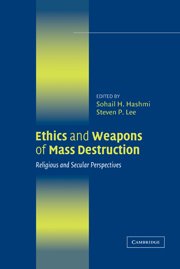Book contents
- Frontmatter
- Contents
- Tables and Figures
- Acknowledgments
- Abbreviations
- Ethics and Weapons of Mass Destruction
- Introduction
- 1 Weapons of Mass Destruction: A Brief Overview
- 2 The International Law Concerning Weapons of Mass Destruction
- PART ONE THE ORIGINAL DEBATE
- PART TWO EXPANDING THE CONVERSATION
- 11 Buddhist Perspectives on Weapons of Mass Destruction
- 12 Buddhism and Weapons of Mass Destruction: An Oxymoron?
- 13 Confucianism and Weapons of Mass Destruction
- 14 “Heaven's Mandate” and the Concept of War in Early Confucianism
- 15 Hinduism and the Ethics of Weapons of Mass Destruction
- 16 Hinduism and Weapons of Mass Destruction: Pacifist, Prudential, and Political
- 17 Islamic Ethics and Weapons of Mass Destruction: An Argument for Nonproliferation
- 18 “Do Not Violate the Limit”: Three Issues in Islamic Thinking on Weapons of Mass Destruction
- 19 Judaism, War, and Weapons of Mass Destruction
- 20 Between the Bible and the Holocaust: Three Sources for Jewish Perspectives on Mass Destruction
- PART THREE CRITICAL PERSPECTIVES
- Contributors
- Index
18 - “Do Not Violate the Limit”: Three Issues in Islamic Thinking on Weapons of Mass Destruction
Published online by Cambridge University Press: 05 June 2012
- Frontmatter
- Contents
- Tables and Figures
- Acknowledgments
- Abbreviations
- Ethics and Weapons of Mass Destruction
- Introduction
- 1 Weapons of Mass Destruction: A Brief Overview
- 2 The International Law Concerning Weapons of Mass Destruction
- PART ONE THE ORIGINAL DEBATE
- PART TWO EXPANDING THE CONVERSATION
- 11 Buddhist Perspectives on Weapons of Mass Destruction
- 12 Buddhism and Weapons of Mass Destruction: An Oxymoron?
- 13 Confucianism and Weapons of Mass Destruction
- 14 “Heaven's Mandate” and the Concept of War in Early Confucianism
- 15 Hinduism and the Ethics of Weapons of Mass Destruction
- 16 Hinduism and Weapons of Mass Destruction: Pacifist, Prudential, and Political
- 17 Islamic Ethics and Weapons of Mass Destruction: An Argument for Nonproliferation
- 18 “Do Not Violate the Limit”: Three Issues in Islamic Thinking on Weapons of Mass Destruction
- 19 Judaism, War, and Weapons of Mass Destruction
- 20 Between the Bible and the Holocaust: Three Sources for Jewish Perspectives on Mass Destruction
- PART THREE CRITICAL PERSPECTIVES
- Contributors
- Index
Summary
It is a pleasure to respond to Sohail Hashmi's thoughtful and thorough chapter. I agree with Hashmi that the debate among Muslims on weapons of mass destruction is not particularly well developed. Indeed, at certain points an analysis of Islamic approaches to WMD must have more the character of a thought experiment than of a descriptive analysis. This being the case, much of what we must do involves exploring the framework within which Muslims can (and sometimes do) discuss WMD. I thus develop my remarks in terms of three points at which the relation between Islamic political thought and the debate over weapons of mass destruction deserves elaboration. These are, first, the place of discrimination or noncombatant immunity in historic and especially contemporary Islamic discourse; second, the distinction between use of WMD and possession for purposes of deterrence (with attendant consequences for questions about nonproliferation and disarmament); and third, the importance of the dialectic between universal and particular in Islamic political thought.
DISCRIMINATION
As developed by classical jurists, the Islamic tradition proposes strictures on resort to and conduct of war. Consider the following report of the Prophet's practice, which is cited almost universally as a starting point for discussion:
Whenever the Apostle of God sent forth an army or a detachment, he charged its commander personally to fear God, the Most High, and he enjoined the Muslims who were with him to do good. And he said: Fight in the name of God and in the path of God. Combat those who disbelieve in God.[…]
- Type
- Chapter
- Information
- Ethics and Weapons of Mass DestructionReligious and Secular Perspectives, pp. 353 - 362Publisher: Cambridge University PressPrint publication year: 2004



